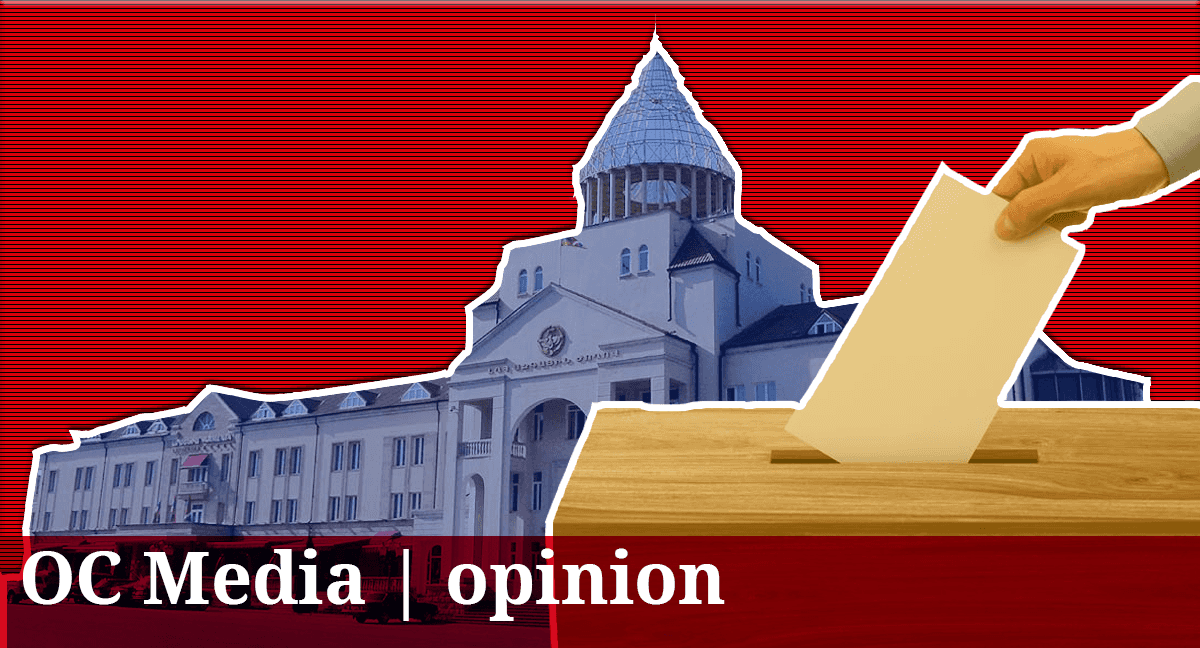
Nagorno-Karabakh is getting ready for presidential and parliamentary elections to be held in two weeks time. Observers say the polls, the first major elections since Armenia’s ‘Velvet Revolution’ in 2018, will be unprecedented in their competitiveness.
On 31 March, for the first time ever in Nagorno-Karabakh, parliamentary and presidential elections will be held on the same day — a result of the new constitution adopted in 2017.
A representative of the Agency of the State Register of Legal Entities under the Ministry of Justice of Nagorno-Karabakh told OC Media that 27 parties have been registered to participate in the elections, 10 of which registered only just last year.
According to the Central Election Commission (CEC), two blocs and 10 parties presented lists for participating in the elections to Nagorno-Karabakh’s parliament, the National Assembly.
The parliamentary elections will be held under a fully-proportional system — voters will vote not for individuals, but for parties, with seats being apportioned to members of electoral lists.
In the current convocation of the National Assembly, 22 of 33 MPs were elected according to a proportional system, and 11 according to a majoritarian system.
Meanwhile, there are 14 presidential candidates this year, a new record, as previous elections had never seen more than five candidates. Two out of 14 candidates are women, and this is the first time that women are balloting for the post of President of Nagorno-Karabakh.
The presidential incumbent, Bako Sahakyan, will not be running in this election.
Presidential elections
Naira Hayrumyan, a political analyst for Lragir.am, told OC Media that after the Velvet Revolution in Armenia, the electoral conditions, previously highly unbalanced — have flattened out.
‘Bako Sahakyan said that he will not support anyone in the elections, and he actually proves this with his actions. The traditional “power candidate — opposition candidate” scheme has lost its meaning, and everyone has almost equal starting positions’, she said.
‘Administrative resources [from the authorities], which played a decisive role during the previous elections, will be minimal this time’, she added. ‘There will simply be nobody to use them.’
The overlap between presidential and parliamentary elections has some worried, however.
Armen Sarkisyan, an MP from the Armenian Revolutionary Federation (ARF), which is the second-largest party in the parliament and currently holds seven of 33 seats, told OC Media that the ARF is concerned that the presidential elections will ‘overshadow’ the parliamentary elections.
Presidential candidates, as individuals, he said, are currently discussed and debated more than party programmes.
According to the CEC, eight out of 14 presidential candidates have been nominated by parties or electoral blocs, while six are self-nominated. Four of five parties currently represented in parliament have nominated a member of their own party for president.
Since 2007, parliamentary parties in Nagorno-Karabakh exclusively supported the candidacy of current President Bako Sahakyan.
‘The previous methods will be difficult to apply’
Political scientist Manvel Sargsyan, director of the Armenian Centre for Strategic and National Studies told OC Media that there are two front-runners in the presidential race right now: The ex-prime minister and chair of the Free Homeland party Araik Harutyunyan, and the incumbent Minister of Foreign Affairs, Masis Mayilyan.
The competitive nature of the election between these two figures, he said, is a result of a ‘split’ among the authorities in Nagorno-Karabakh.
‘The administrative machine is operating inefficiently, the ruling elite has lost its leverage of influencing the people. This, of course, is related to the revolution that took place in Armenia. Now people cannot be forced to do something’, he said.
However, that does not preclude attempts to influence people with the ‘old methods’.
‘I have repeatedly met in Artsakh [Nagorno-Karabakh] with [different people] who say that the old methods to attract people [are still taking place]: they provide someone with financial assistance, someone else’s loans are covered.’
As for the authorities in Yerevan, Sargsyan said that he believes they ‘do not intend to intervene’.
‘Now everyone is in favour of change’
Lusine Avanesyan, a journalist based in Nagorno-Karabakh, told OC Media these elections are fundamentally different from the ones in the past.
‘After the change of power in Armenia, the formation of power in Artsakh was seen as an instrument not only for the formation of power but for the transformation of relations in society’.
‘Now everyone is in favour of change’, she said. ‘Both new political forces and those who, at least before the 2017 constitutional elections, were on the team of Bako Sahakyan.’
Avanesyan says that while some are tempted to criticise individuals for the problems facing Nagorno-Karabakh, for example, Araik Harutyunyan in his capacity as ex-Prime Minister, the responsibility for problems in Nagorno-Karabakh is much wider.
Until 2017, she said, the government functioned with the consent of three parties — the Democratic Party, the Armenian Revolutionary Federation (ARF), and the Free Homeland Party.
‘For the situation in the country, the parties that have now nominated various candidates are responsible’, she said.
All place names and terminology used in this article are the words of the author alone, and may not necessarily reflect the views of OC Media’s editorial board.








